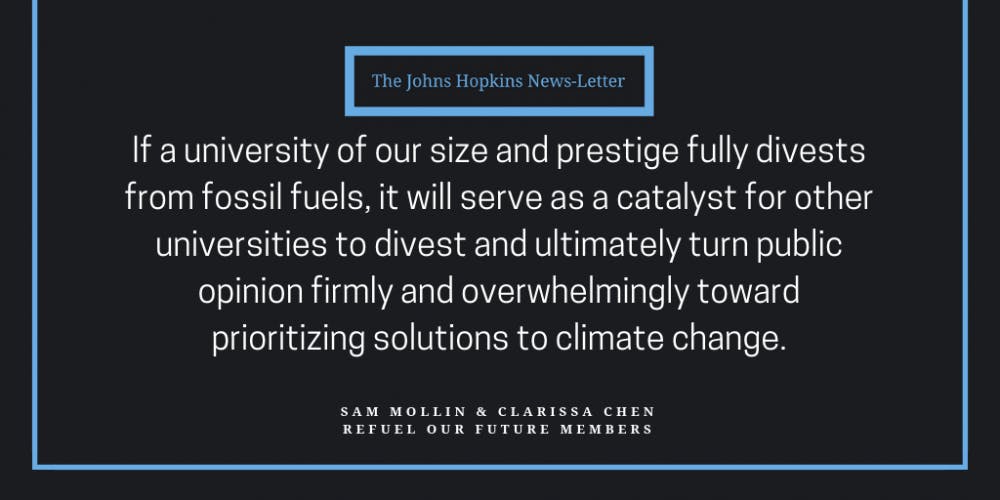To the Hopkins Undergraduate Student Body:
This week, Refuel Our Future kicked off its campaign against donations to the University. We constructed a graveyard on Keyser Quad memorializing things we are losing to climate change and launched a social media campaign on Facebook. Now that our initial push has concluded, we want to take the chance to re-introduce ourselves as a club and explain why we chose the tactics we did.
Since 2011, Refuel Our Future has been pushing Hopkins to fully divest all of its holdings in companies that profit from the production of fossil fuels. We believe that it is the University's moral responsibility to take money out of the fossil fuel companies that have caused our climate change crisis and have prolonged it by bribing and lobbying government officials into rejecting common sense regulations and measures to fight climate change.
Last December, six years of research, organization and student outreach culminated in a vote by the Board of Trustees on the Public Interest Investment Advisory Committee (PIIAC)’s proposal for full fossil fuel divestment. Ultimately, they voted to divest from all companies that make 35 percent or more of their profits from coal, a clear concession to the stronger actions we should have taken.
Internationally, environmental activism is also stronger than ever. Sunrise Movement staged a historical sit-in at Congresswoman Nancy Pelosi’s office pressuring her to adopt a Green New Deal. The divestment movement worldwide has had a few recent wins: Faculty signed a resolution at Middlebury College to divest from fossil fuels and Whitman University’s Board voted to completely divest from all fossil fuels.
So what are we doing at Hopkins? This year, we’ve focused on targeting donations to the University — specifically the Senior Class Gift. We believe it’s necessary to strategically target what hits the University’s top decision-makers the hardest: publicity and money.
The main purpose of the Senior Class Gift — and the reason the administration puts so much money and resources behind it — is to boost the University’s reputation. When more graduating seniors donate, organizations like the U.S. News and World Report give Hopkins a higher alumni satisfaction ranking. This plays an important role in our overall rankings among universities.
Above all, the goal of the administration and the Board of Trustees is to boost our prestige and reputation, often at the cost of more worthy goals. By targeting our ranking directly, we force the University to pay attention to full divestment instead of trying to sweep our obligation to the environment and the world under a false coal divestment PR scheme.
When people donate as seniors, they tend to donate for the rest of their lives. By targeting senior donations now, we can also affect the amount of donations Hopkins receives in the long term. Until the Board of Trustees approves the PIIAC proposal they chose to disregard last December, we will continue to target the Senior Class Gift and all donations.
We do acknowledge that the Senior Class Gift often financially benefits student groups and other causes within Hopkins. We also recognize that the vast and all-encompassing nature of our current climate crisis necessitates dramatic and immediate action that will cause the University to pay attention. Helping out student groups by donating some of your money before you leave is clearly laudable, and Refuel will be sure to encourage all of our petition signers to donate once our campaign has ended. In the meantime, you can still donate your money to clubs and organizations directly.
We ask you all to consider Michael Bloomberg’s donation. In his op-ed to the New York Times, published along with the publicization of his historic donation, he asked that people continue to donate. But he also acknowledged that private donations to a university will never be enough to ensure real socioeconomic equality in universities. He understood that it requires greater government action to truly make and that it is fundamentally wrong for a university to fleece it’s student’s pockets to make up for society’s failings. In the same way, we are also advocating for policy-level, systemic changes.
We believe that now climate action is increasingly urgent and that we can push our student activism further. Reports by the United Nations (UN) and the U.S. show that should the status quo continue, hundreds of millions of lives and hundreds of billions of dollars will be lost to climate change in the near future. In particular, the UN Intergovernmental Panel on Climate Change Report projects that we will face catastrophic climate change by 2040 if we don’t take immediate action to virtually eliminate our emissions by 2030. If we fail, we will face more floods and natural disasters, higher food prices and much more.
If a university of our size and prestige fully divests from fossil fuels, it will serve as a catalyst for other universities to divest and ultimately turn public opinion firmly and overwhelmingly toward prioritizing solutions to climate change. Divestment from South Africa’s apartheid regime and the tobacco industry has proven that this is an effective tactic to enact change. Given our climate change crisis, we need to act again.
This year, don’t donate in a cynical ploy to boost our rankings. Choose to donate zero dollars instead, and sign our pledge to not donate to Hopkins. Make a greater difference to the environment then you ever could by donating to our already wealthy university.
Clarissa Chen is a senior studying Public Health, Global Environmental Change & Sustainability and Social Policy from Bloomington, Ind. She is the lead organizer of Refuel Our Future.
Sam Mollin is a sophomore studying Political Science and Environmental Studies from Larchmont, N.Y. He is the communications head of Refuel our Future.





